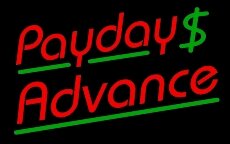Despite New Campaign, Payday Advance Lenders Under Fire
By Paul RizzoPayday Loan Writer
Soft music plays in the background of a new TV ad campaign as it urges viewers to only use cash loans for emergencies. One scene shows a broken-down car. Another depicts a young boy in a doctor’s office, his arm in a sling.
“Please borrow only what you feel comfortable paying back when it’s due,” says Darrin Andersen, president of the Community Financial Services Association. A new emblem will tell borrowers which lenders meet his trade group’s requirements, Andersen says in the ad.
The $10 million campaign, announced last month along with some industry policy changes, came as states from Virginia to New Mexico consider legislation to limit quick payday advance lending practices. But it’s not stopping consumer watchdogs and people already in debt from questioning the motives of an industry whose loans’ annual interest rates can exceed 400 percent.
 “Payday lenders make it easy for consumers to get trapped in predatory debt,” said Teresa Arnold, legislative director for AARP in South Carolina.
“Payday lenders make it easy for consumers to get trapped in predatory debt,” said Teresa Arnold, legislative director for AARP in South Carolina.
Rena McFadden and her husband are two people who’ve become trapped. Her husband has been dealing with bad credit payday loan lenders threatening court action unless the McFaddens quickly repay the $2,400 they owe.
“The time to repay is too short. He’s been trying to talk to them, but they won’t talk,” said McFadden, a 39-year-old who works in a dry cleaning shop. “They want the money by the next pay day. How are you supposed to pay your bills?”
There are more than 22,000 check cash advance locations in the United States that garner $6 billion annually in revenues, according to Steven Schlein, a spokesman for the financial services association, which represents about two-thirds of payday lending companies.
The payday loan industry’s biggest change would give customers more time to pay back a loan with no financial penalty. This “extended payment plan” would be available at least once a year and provide borrowers between two and four extra months to pay off loans. It was paired with the ad campaign and a ban on ads that promote payday cash advances for “frivolous purposes” like vacations.
But lawmakers are still pushing changes. In South Carolina, home to Advance America, the nation’s largest payday lender, lawmakers are considering a measure that would cap at 36 percent the annual interest fee on the loans and limit the number of payday loans a consumer could have with a single payday loan company.
Eleven states already have similar interest-rate limits on payday lenders, according to consumer watchdogs, and the personal cash loan lending industry considers such rates too low to remain profitable. New proposals in 10 other states would impose similar limits, said Carol Hammerstein, a spokeswoman for the Durham, N.C.-based Center for Responsible Lending.
Hammerstein said the push for new interest rate limits comes in the wake of caps imposed last fall by Congress. Legislators put a 36 percent annual cap on loans to military service members following disclosures that thousands of troops were in debt to payday lenders.
State Rep. Alan Clemmons, a Republican who introduced the South Carolina legislation, said it’s needed because neighboring states have either banned or sharply restricted faxless online payday loans. In response, lenders have increased business in South Carolina, and the state has become “payday lender Mecca,” Clemmons said.
Jamie Fulmer, director of investor relations for Spartanburg, S.C.-based Advance America, said the loans are paid back on time by the vast majority of customers and that penalties for bouncing checks or making late credit-card payments are more severe than payday loan rates.
He said the industry was willing to consider “reasonable” change, but that Clemmons’ proposal to cap the personal loans was a backdoor attempt to end them. It would amount to the industry earning only $1.38 per $100 for a two-week loan — far too little to cover overhead, he said.
“It costs more money to go to a bank and withdraw my own money from an ATM,” Fulmer said. “The market is pretty efficient. If there were someone out there who could offer this product to consumers less expensively, they would do it.”
Click here to read the rest of this article.

